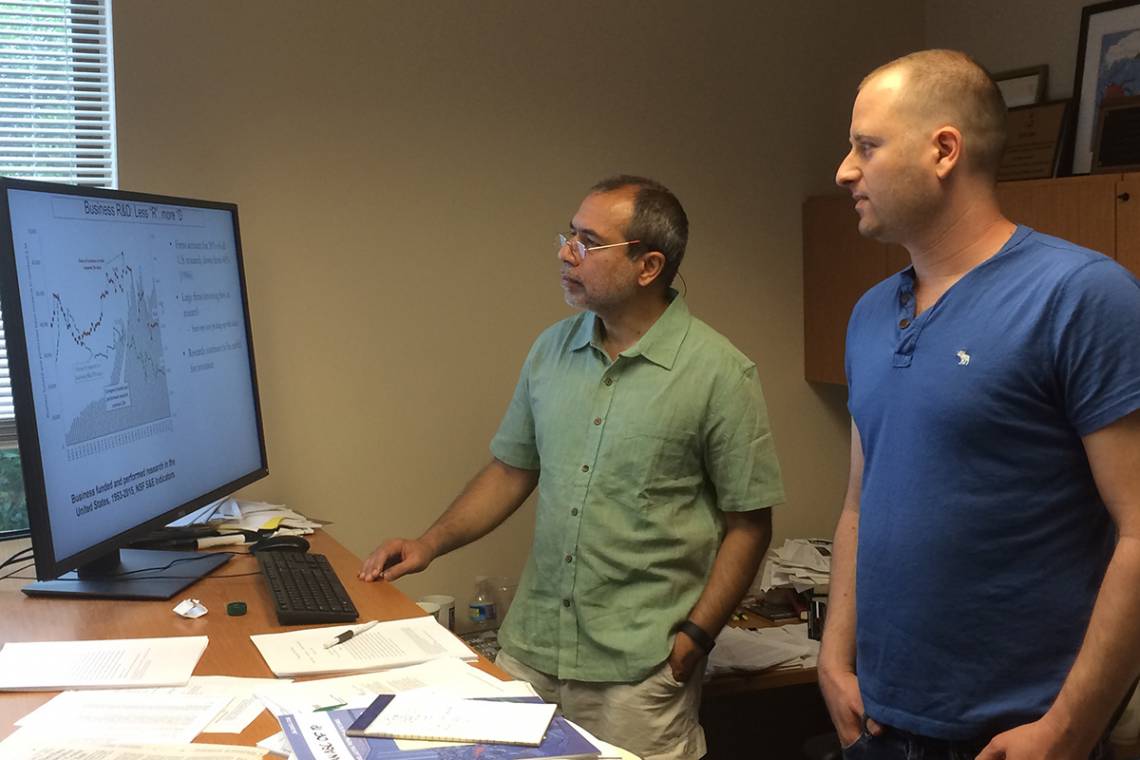Professors Track the Decline of Corporate Research on New Web Platform
I&E-hosted website underscores concerns for future of American research

Ashish Arora and Sharon Belenzon have a straightforward message: Science is the golden goose, patents are the golden eggs it lays, and all of this is threatened by a three-decade decline in American industries' support for research.
Both faculty members at the Fuqua School of Business, Arora and Belenzon’s research is culminating at a time when it may matter the most. The decline in corporate support isn’t changing any time soon and if the federal government follows suit, they ask where will research relevant for invention come from in this country?
Their research documents a decline in corporate labs dating back to the 1980s and a greater reliance on university and publicly funded research. Other researchers have noted these trends, but Arora, Belenzon and their collaborators have been the first to document these trends systematically.
They have compiled data on all publicly traded companies that report R&D expenditures seeking to understand why this decline has occurred. The possible culprits include competition from low wage countries like China, short-term thinking among managers and stock-market investors, and the inability of firms to monetize their research. Arora and Belenzon’s research findings are available here and here.
However, with a view toward informing the public discussion of these trends, they are making their data and findings available through the web. That web platform, called “The Golden Goose,” is now available for public use.

Users of the platform can see trends across an entire sector or can search for specific companies. Each company has information attached to it, with data ranging from 1980 to about 2006. This data includes data about research publications and the patents the company has taken out. Pie charts provide information such as a breakdown of internal company users of the company’s research, as well as external users of the science.
The underlying theme that comes out of the data is companies’ emphasis on research has declined.
Arora and Belenzon believe that this platform lays out the data in a way that could be instructive to policy change.
“It’s a question of budget priorities,” Arora said. “The proposed budget cuts funding for science and technology, but the data show that over the long term, company funding for research is not going to grow; someone else will have to fund research. Public support for research will be vital for the U.S. to not lose its leadership in science and technology research and to maintain its stance as a place companies want to go.”
“Even today, about 30 percent of the research in the United States is funded and performed by corporations,” Belenzon said. “This corporate money for research is likely to decline, and something has to replace it.”
They’re taking this message to federal legislators, including participating in a conference discussing the decline of corporate research and a briefing for U.S. Senator Chris Coons.
Aside from policymakers, Arora hopes the data will be useful to researchers and entrepreneurs. “The Golden Goose” will be hosted by the Duke Innovation & Entrepreneurship Initiative, and Belenzon said that entrepreneurs could use the data to understand how their university-based research may be used by large corporations.
“What’s happening to innovation is being measured here,” Arora said. “For people studying an entire sector, one glance can show how patenting and publishing in the sector behaved.”
They also hope the public platform will help members of the public to better understand the changing relationship between research and development. For now, the Golden Goose data spans until 2006, when the pair stopped tracking this kind of data, but are planning to seek external support to update the platform.